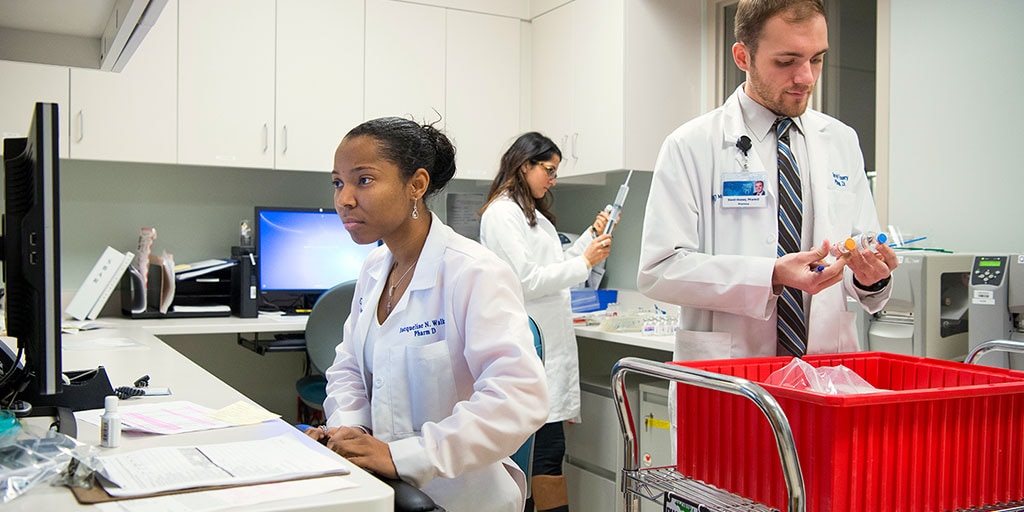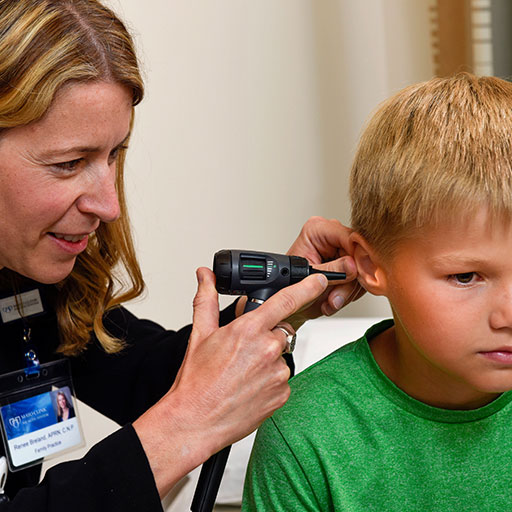
What does a pharmacist do?
Pharmacy is a blend of science, health care, direct patient contact, technology, ethics, and business. A pharmacist is a highly-skilled and trusted medication expert. They know and understand everything there is to know about drugs. Pharmacists undergo extensive education in order to understand the role that drugs play in different situations. They are familiar with the biochemical make up of drugs and how that impacts their use, side effects, interactions, and implications of effectiveness. Their role revolves around dispensing prescriptions to patients, conducting health screenings, giving immunizations, and advising on the safe use of medicine.
Scope of practice
Pharmacists work with doctors, nurses, and pharmacy technicians. Common tasks and duties include:
- Dispensing medication per the prescription, or doctor’s orders
- Consulting patients on prescribed medication usage
- Communicating with physicians to dispense medication correctly
- Directing patients toward over the counter medications to treat their ailment
Specializations
Specialization by location
One way that pharmacists can specialize is in their practice area. Pharmacists are able to practice in a variety of industries and other settings. These specialty areas will impact roles, responsibilities, and career paths:
- Academia pharmacist
- Community pharmacist
- Government pharmacist
- Hospital pharmacist
- Industry pharmacist
- Military pharmacist
- Research pharmacist
- Wholesale pharmacist
Specialization by specialty area
Licensed pharmacists can become board certified in a specialty area of pharmacy, including:
- Ambulatory care
- Critical care pharmacy
- Nuclear pharmacy
- Nutrition support pharmacy
- Oncology pharmacy
- Pediatric pharmacy
- Pharmacotherapy
- Psychiatric pharmacy
Work environment
Employers of pharmacists typically include hospitals, retail stores, nursing homes, assisted living facilities, universities, governmental facilities, mail services, and internet companies. They spend the majority of their work day on their feet, consulting with patients and physicians. They may need to work a variety of shifts, including nights, weekends, and holidays.
Becoming a pharmacist
Pharmacists are extremely accessible health care professionals that work closely with patients and physicians to determine that correct medications and dosages are prescribed for each patient. They have very rewarding work, but it is not easy nor should it be taken lightly. Medication errors can be extremely harmful to patients, so individuals interested in becoming a pharmacist must pay close attention to detail.
Higher education requirements
A pharmacist must attend pharmacy school and earn a Pharm.D. degree. The Pharm.D. degree takes four years to complete and requires at least two years of undergraduate college study. Many students enter the program with three or more years of college and may even have a bachelor's degree.
Internships and introductory pharmacy practice experiences give students hands-on skills and an in-depth look at pharmaceutical services. Advanced pharmacy practice experiences, or rotations, help student pharmacists appl0y knowledge they learned in school to the real world.
After graduating with a Pharm.D. degree, many pharmacists choose to complete a postgraduate residency training program. This year-long program gives students the opportunity to apply the skills learned in pharmacy school to real patients and situations.
Pharmacists who complete a postgraduate year one residency can work as a clinical pharmacist in a hospital. Pharmacists who go on to complete the postgraduate year two residency can focus on a specialty such as critical care or oncology.
Certification process
To obtain a license to practice as a pharmacist, you must:
- Complete an accredited pharmacy program
- Serve as an intern under a licensed pharmacist
- Pass a state examination
Career opportunities and outlook
Pharmacists can expect an annual median salary of $128,570.
After graduating from pharmacy school or completing postgraduate training, pharmacists have countless career opportunities available. The Bureau of Labor Statistics expects employment of pharmacists to decline slightly overall, with fewer estimated jobs for pharmacists in retail or drug store settings. However, the demand for skilled pharmacists in hospitals and clinics is expected to grow.
With additional training and education, some pharmacists advance into management, research, or teaching (preceptor) positions. Some pharmacists open their own pharmacies. Other opportunities for advancement are available by completing a residency in a particular specialization.
By the numbers
median annual salary
years of higher education
job growth projected from 2020-2030
Pharmacy programs at Mayo Clinic
- Pharmacy Residencies
- Pharmacy Internship (Minnesota)
- Advanced Pharmacy Practice Experience (APPE) Hospital/Inpatient (Arizona)
- Advanced Pharmacy Practice Experience (APPE) (Florida)
- Advanced Pharmacy Practice Experience (APPE) (Minnesota)
Browse similar careers

Dietitian

Nurse practitioner
